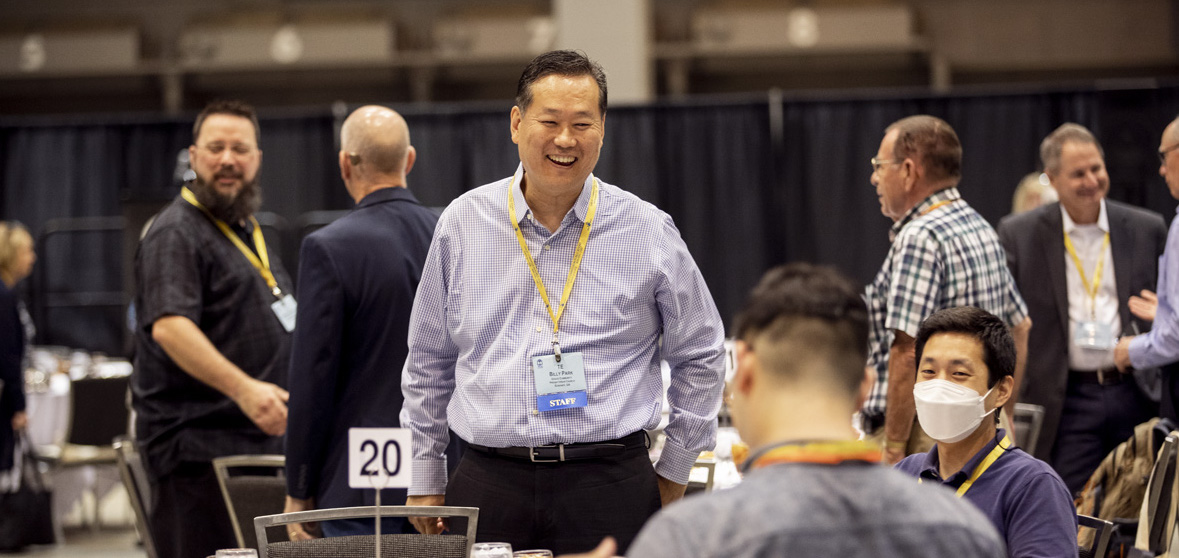
One denomiNation.
Multiple Languages.
More than ten percent of PCA churches, presbyteries, and teaching elders are Korean-American. The prevalence and growth of Korean Americans in the PCA isn’t a recent phenomenon. It was four decades ago when the first Korean-language presbytery was formed. However, it was only seven years ago when teaching elder Dr. Lloyd Kim, a Korean-American, was elected Coordinator of Mission to the World and just five years ago that the first Korean-American, ruling elder Alex Jun, was elected to serve as Moderator of the 45th General Assembly. Currently, the executive leaders of the Gospel Coalition, the Lausanne Committee on World Evangelization, and the National Association of Evangelicals (NAE) are all PCA, Korean-heritage teaching elders – for which we are very grateful.
Our Korean-language fathers and brothers have faithfully co-labored with majority-culture PCA churches, continually overcoming obstacles to seamless participation in our denomination. The business of our church courts isn’t always conducted in the first language of first-generation Korean leaders. The customs and habits of our gatherings do not always recognize the customs and contributions of Korean culture that have blessed Christian worship and outreach worldwide. It has required courage and perseverance for Korean leaders to become a vital part of the Presbyterian Church in America. Yet, through the faithfulness of Korean-heritage churches and leaders, the entire PCA has been blessed in its ministry and mission. Through Korean leadership the PCA is learning to reach segments of our society and world that were not previously in our focus or capabilities.
Today the PCA has:
- 9 Korean-American presbyteries
- 215 Korean-American churches
- 692 Korean-American teaching elders
- 3 Korean churches among the largest 50 PCA congregations
How does an English-speaking denomination unite with Korean-Americans toward full participation in the inner life of the church? As the Administrative Committee, we take seriously our duty to promote the unity, purity, and mission of the church among all parts of the denomination. To that end, the Administrative Committee has done the following:
- Translated into Korean the Book of Church Order (BCO) and any annual updates to it.
- Translated annually into Korean the Stated Clerk’s report concerning the actions of General Assembly.
- Provided a dedicated representative on staff to serve Korean-language churches.
- Supported the clerks of Korean-language presbyteries with the translation of important administrative resources.
- Assisted Korean-language churches as requested when searching for pastors.
The Administrative Committee isn’t alone in serving the needs of Korean-American congregations.
- PCA Retirement and Benefits has a full-time financial planning advisor to serve the staff of Korean-American churches. Paul Chi’s primary responsibility is to provide pastors, plan participants, and churches with retirement, investment, insurance, and general financial planning advice and guidance. He also visits presbyteries, churches, schools, and seminaries to conduct seminars on financial wellness and retirement readiness and to meet individually with our ministry partners.
- Mission to North America has also organized an initiative to assist Korean-American congregations with church planting and leadership development efforts. Teaching elder Bill Sim leads MNA’s efforts to serve, equip, and mobilize the PCA Korean constituency to foster relationship and partnership with the ministry of MNA and the larger PCA community for the purpose of growing and multiplying healthy churches.
Why would Korean speakers want to be part of an American denomination? According to Bill Sim in an interview with byFaith,
Personally, I don’t want to be a part of a Korean-only denomination. We’re not living in Korea. We want to be the PCA church in America, not a PCA church in Korea. And looking toward the future, a Korean denomination won’t meet the needs of the next generation, who are largely English speaking.
Ultimately, we want to be a part of a larger denomination. We need that cooperation and fellowship. In my opinion, the PCA is a very healthy denomination. A lot of us are delighted to be a part of it. Because of our special needs (language and cultural barriers), we want to find better and more ways to engage with other presbyteries and churches. There’s no sense across the Korean presbyteries of wanting to create our own denomination. Period.
As we promote the unity of the church, the Administrative Committee is here to connect all parts of the church to each other. This requires an intentional effort to overcome linguistic and cultural barriers in order to serve all parts of Christ’s body. We are grateful for our Korean-American brothers and sisters and pray that God would knit us ever closer together so all may benefit from the gifts and graces our King has entrusted to them.


